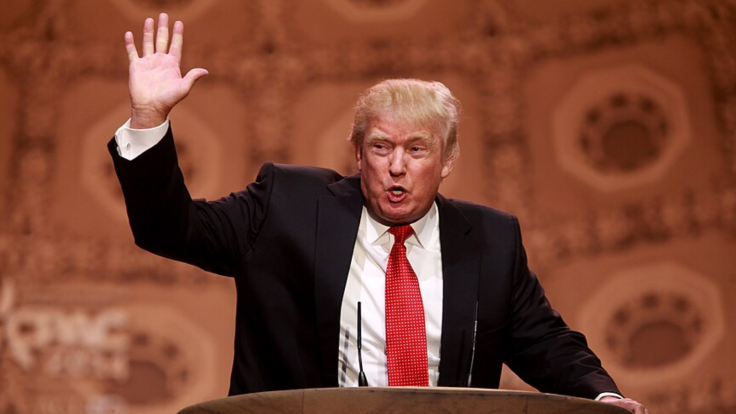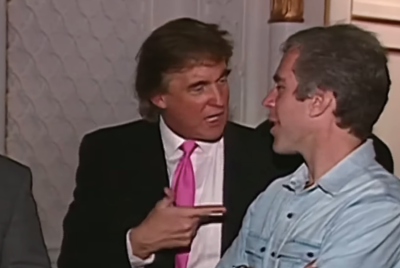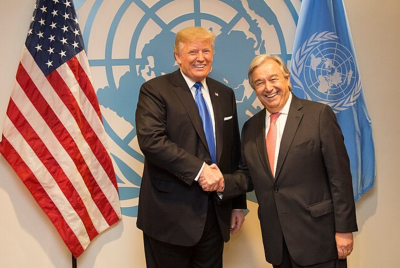'Guilty?' Trump Explodes At Reporter, Yells 'You Are The Worst!' Over Epstein Files
A sharp exchange on Air Force One as House releases thousands of Epstein-related pages, prompting confrontations

US President Donald Trump erupted at reporters aboard Air Force One when challenged about newly released Jeffrey Epstein documents, calling a journalist 'the worst' and telling another to be 'quiet, piggy'.
The exchange came as Congress released tens of thousands of pages of Epstein-related material and as the White House confronted renewed scrutiny over who appears in the records. The President's brusque outburst, captured on camera, crystallised a widening political fight over transparency, presidential temperament, and the public handling of explosive files tied to one of the country's most notorious sex offenders.
The encounter was watched and dissected across social media, Capitol Hill, and international newsrooms, intensifying questions about what the documents reveal and how the administration will respond.
A Tense Gaggle Aboard Air Force One
During a press gaggle, Trump fielded a battery of questions about the House Oversight Committee's latest production of Epstein estate materials and grew visibly impatient with interruptions.
When a female reporter persisted, the President snapped, 'Quiet. Quiet, piggy', and later, as another reporter interrupted him, barked, 'You are the worst. You're with Bloomberg, right?' The confrontation is preserved in full on video and in contemporaneous transcripts.
@nypost President Donald Trump snapped at a reporter during a press gaggle outside Air Force One on Sunday. While Trump was answering a question, a reporter began to ask the commander-in-chief a follow-up, which seemingly ticked off the president. "Would you let me finish my statement?
♬ original sound - New York Post | News
The viral clip crystallised the moment for viewers, the President pointing and raising his voice while aides and reporters look on. News outlets and independent uploads quickly disseminated the footage, making the gaggle and the language used a focal point of national debate.
What the Epstein Documents Show
Congressional releases this month added roughly 20,000 pages to an already vast trove of Epstein-related records, documents the House Oversight Committee said were produced by the estate and are now public or searchable in bulk.
Committee materials include emails, logs, and correspondence that investigators and the public contend could illuminate Epstein's network and contacts. Oversight Democrats highlighted specific email threads that they say raise new questions about who knew what and when.
Among the most politically combustible elements are references and messages in which Epstein and his associates discussed prominent figures. Committee releases and searchable repositories have prompted renewed scrutiny of previously reported encounters, dinners, and communications involving the late financier's circle. Lawmakers from both parties have debated whether further declassification and release are necessary to restore public confidence.
Temperament and Transparency Collide
The sharp exchange on Air Force One was more than incidental theatre. It occurred against the backdrop of an intensifying legislative push, including a House vote this week, to force the release of unclassified Epstein materials held by the Department of Justice.

The feud has placed Trump between his public insistence on openness and the political realities of a charged, partisan inquiry. Critics said the President's language demeaned a working journalist and underlined a pattern of confronting adversarial questions with personal attacks. Supporters argued he was protecting a message and refused to be baited.
Veteran reporters who watched the clip told colleagues that the moment echoed long-standing tensions between an assertive White House and a press corps that believes in persistent, adversarial questioning.
For victims' advocates and survivors watching the releases of Epstein material, the public spectacle of presidential irritation risked eclipsing substantive revelations contained in the documents themselves.
Political Fallout and the Calculus on Capitol Hill
The gaggle was seized upon quickly by lawmakers and pundits. Democratic committee members framed the President's reaction as deflection; some Republican allies downplayed the language while reiterating the need to focus on policy priorities.
The House Oversight Committee's release has intensified pressure on the Speaker and committee leaders to answer for decisions about what to redact or withhold. The partisan tug over the files now intersects with a broader fight about public access to potentially embarrassing or politically damaging records.
What happens next will be political as much as legal. If the House moves to compel broader releases, courts, agency officials, and perhaps the White House counsel's office could be drawn into protracted disputes over classification, privacy, and the public interest.
Meanwhile, the President's televised impatience may reshape how the episode is remembered, as a substantive debate about disclosures or as another example of heated rhetoric at odds with the dignity of the office.
© Copyright IBTimes 2025. All rights reserved.




















